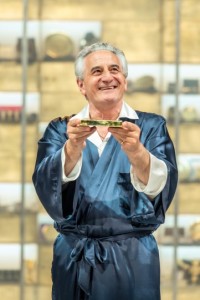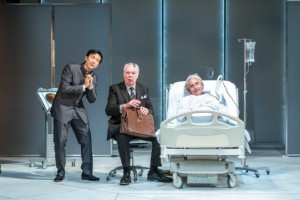When Ben Jonson delivered his new comedy Volpone to the King’s Men in early 1606, Richard Burbage must have cheered. Jonson would have written the leading role with Burbage in mind, as Shakespeare also wrote roles for his most popular and talented actor. But Shakespeare had been producing tragedies like King Lear and Timon of Athens, and those odd comedies Measure for Measure and All’s Well That Ends Well. Lear is certainly one of the greatest roles in English drama, but for an actor of the skills of Burbage, in particular with the ability to engage an audience directly, the greedy, calculating, disguise-loving Volpone must have been a great gift.
This only occurred to me recently, after seeing Henry Goodman play the role in Trevor Nunn’s RSC production. I’ve never seen the title role acted with such energy and flair. It’s usually Mosca, the endlessly inventive servant, who overshadows Volpone particularly where his master is reduced to lying almost motionless in bed. Volpone himself is rarely attractive, but Goodman suavely charms his audience from the moment we first see him.
Having spent much of the first part of the play prone in bed, Volpone suddenly has the chance to be outrageously funny in the mountebank scene, and Goodman grasps this opportunity, as, we can imagine, Burbage did, turning into a market-trader to sell his miracle health-oil with much banter and singing. In past productions I’ve found this scene tedious, but thinking of it as the opportunity for the greatest actor of his generation to show off, it makes sense.
This makes it even more of a shock when in the scene with Celia, with whom he claims to have fallen in love, he shackles her to the bed and threatens her with rape. It’s a step you feel Shakespeare would not have taken: our liking for Volpone suddenly evaporates, replaced by feelings of doubt. It made me think of Marina’s plight in Shakespeare’s Pericles, written a few years later, when faced with being raped, Marina is given the words to talk herself out of her dangerous situation. This and the scene where she tells Pericles her story, are some of the most powerful Shakespeare ever wrote, but here Celia has to be rescued by the clumsy device of a virtuous young man appearing on stage and whisking her away from Volpone.
In the talkback that took place after the performance on Tuesday evening many of the questions, and the resulting discussion, centred on the “rape scene”. Rhiannon Handy, playing Celia, had been uncertain how to play it: surely she should put up a fight? The actors had already explained that Trevor Nunn justified everything through the text, and in this case he had insisted that unlike some of Shakespeare’s spunky heroines, Celia has been abused to the extent that she has little fight left in her. Just before this scene, her husband, hoping to be the inheritor of Volpone’s wealth, threatens her with violence to make her agree to stay alone with him.
I will drag thee hence home, by the haire;
Cry thee a strumpet, through the streetes; rip up
Thy mouth, unto thine eares; and slit thy nose.
After the rape scene the audience may agree that Volpone deserves the punishment meted out to him, but Volpone, or the actor playing him, has the last word. In the epilogue we can imagine Richard Burbage, the audience’s favourite, speaking as himself:
The seasoning of a play is the applause.
Now, though the Foxe be punish’d by the laws,
He, yet, doth hope there is no suffring due,
For any fact, which he hath done ‘gainst you;
It there be, censure him: here he, doubtfull, stands.
If not, fare Jovially, and clap your hands.
Another question at the talkback was an observation that Volpone seemed uncertain during the rape scene. Was Goodman implying that Volpone had doubts about raping Celia? Well, no. The bed, intended to come up through the trap from below the stage, had stuck, and Goodman had had to fill in. What the perceptive member of the audience had detected was “chaos and fear”. The audience, Goodman noted, would always seek for meaning, even when there was none.
There would have been no such problems on the early modern stage as beds must have arrived by more straightforward routes. If you’re intrigued by the significance and staging of bedroom scenes in Elizabethan and Jacobean drama, you could go to the Research in Action event at the Sam Wanamaker Playhouse, Shakespeare’s Globe, in London on Thursday 6 August. Entitled Beds and Bedroom Scenes, Dr Will Tosh and Elizabeth Sharrett will explore how playwrights exploited the intimacy of the indoor playhouse to highlight moments of seduction and delight, sexual violence and sexualised murder. Actors will play out scenes from Beaumont and Fletcher’s The Maid’s Tragedy, John Ford’s Tis Pity She’s a Whore and James Shirley’s Love’s Cruelty, under the direction of James Wallace.
The RSC’s production of Volpone, is on at the Swan Theatre in Stratford-upon-Avon until 12 September 2015. Sadly it is not one of the RSC shows that is to be live streamed to cinemas.
All photos of the RSC’s production are by Manuel Harlan and copyright of the RSC




